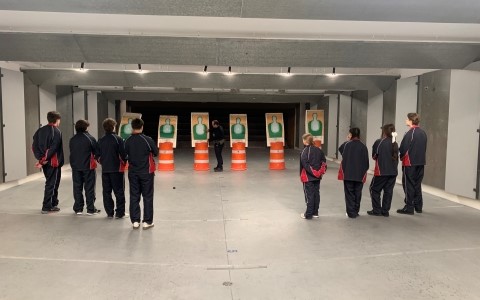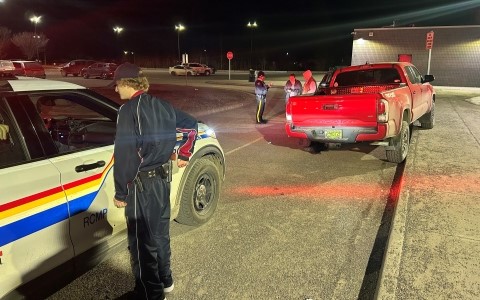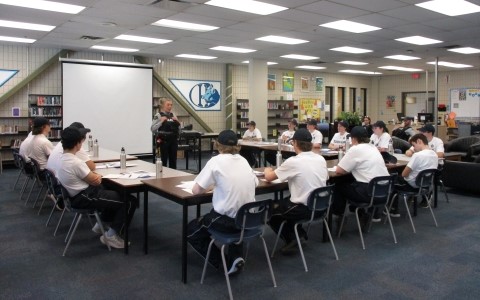RCMP Youth Academy offers teens authentic Depot experience
By Patricia Vasylchuk

Milliken-Heap (2nd row, second from left) with her troop during a visit to an RCMP airport hangar in 2024.
Image by RCMP
March 6, 2025
Content
March Break will look a little bit different for 21 high school students from Northern British Columbia this year. The group of teenagers will form Troop 20 and spend a week at the RCMP Youth Academy in Prince George, an immersive overnight camp dedicated to giving participants an authentic experience that mimics what cadets do at Depot, the RCMP training academy.
The camp, which launched in 2003, is a partnership between Prince George RCMP and the local school board. Every spring, the camp hosts approximately 25 students from all over Northern British Columbia, and allots them four credits toward graduation.
"[We do it] to facilitate good working and personal relationships with the school district, to integrate with the students on a level that they've probably never seen before, and because we can help the RCMP recruit students who have a legitimate interest in joining the RCMP," says Constable Trevor Hurley, an RCMP officer in Prince George, British Columbia, who is responsible for coordinating the camp.
Authentically immersed
Each participant will be given a uniform and a duty belt complete with intervention tools. The troop will spend seven days at College Heights Senior Secondary School in a space transformed into a para-military setting where students will participate in hands-on learning and sleep in simulated barracks complete with individual cots.
"We try to make it as close to what cadets experience at Depot as possible," says Hurley, who will join between 85 and 100 volunteer RCMP officers and employees, retired and former auxiliary officers, and others in guiding students through a series of daily immersive training sessions. These include scenario-based and classroom learning, visits to special locations such as the RCMP airport hangar, the courthouse, and a tour of the detachment, and fitness training including daily runs, drills, and a run-through of the Police Fitness Assessment (PFA), which every RCMP cadet must pass before graduating from Depot.
Some of the topics that will be covered during the in-class learning sessions include: using the polygraph and other interrogation tactics, forensic identification, use-of-force options including firearms, OCC spray, and handcuffs, search and seizure, organized crime and drugs, and many more.

Bringing learning to life
But by far, the most popular aspect of the camp is the scenario-based training, according to Hurley. These include hands-on sessions on how police should respond to calls about fights and refusals to leave, assault, theft and robbery, threats to life, threats of suicide, and sudden death or murder.
"For the theft-from-a-vehicle scenario, we actually have a car set up on one side of the school lot, and the cadet is in an RCMP cruiser on the other side of the lot," says Hurley. "The call will come to the student over the radio just like it would to us in real life, and the RCMP officer will drive them over to the vehicle. We let the students go as far as they can on their own and then we'll assist them."
Katrina Milliken-Heape participated in the Youth Academy in 2024.
"It was really interesting how in-depth we got, where I was only expecting to skim over the surface," says Milliken-Heape of the in-class learning sessions. "We had the ERT team actually come in and show us all their equipment, and the street crew showed us how they did all their drug busts, and we got to try and solve a pretend case with Major Crimes."
She says the organizers did a great job keeping the learning interactive.
"Even the session on how to use the polygraph, we had the guy actually come in and show us how the polygraph works as he was teaching," says Milliken-Heape.

Leading with honour
On Day 2 of the Academy, Milliken-Heape was made the Right-Marker of the troop—an honour given to the person showing the most promise as a leader and who shows they act on behalf of the good of the troop instead of themselves. As Right-Marker Milliken-Heape was responsible for leading the group and making decisions on their behalf, for the duration of the camp.
While Milliken-Heape is still undecided about whether policing is in her future, she says the experience helped her better understand police work and see what the RCMP training process is like.
"It was a lot more mentally demanding than I thought it was going to be," says Milliken-Heape of the 6 a.m. to 11 p.m. daily schedule. "But I really, really enjoyed it and thought it was a good look at how Depot works, and show whether that's the right job for you and whether you think you could make it through those six months [of training]."
Recruitment 101
Hurley says the Youth Academy has been a great tool to encourage young minds to consider a career with the RCMP.
"Every year, we seem to have a couple students who are really on the ball," says Hurley.
In 2018, it was then 17-year old Constable Mekenna Parker that caught the eye of camp organizers, when she participated in the Youth Academy after hearing about it from friends who participated in a previous year. Like Milliken-Heape, she was also made Right-Marker of her troop.
"She was a high candidate right from the very beginning and it worked out," he says of Parker, who was training at Depot within five years of participating in the Youth Academy.
Reflecting back on the experience, Parker says it was difficult but rewarding. "You're pushed to do things that you haven't done before, you're getting an average of five hours of sleep a night. It's all very new: new people, new environment. So, you're kind of put through a bit of stress, but that's the purpose of it," she says, adding "I guess, I fell in love with the career."
But not everyone who participates in the Youth Academy wants to pursue law enforcement, admits Parker.
"Policing isn't for everyone and that's also why we do the Youth Academy," she says. "It's not always happy and safe and there are other negative parts to the job, and I think that being transparent about that is a good thing."

Sharing a passion
Parker, who's now a general duty RCMP constable in Fort St. John, in Northern British Columbia, returned to help with the Youth Academy in 2024 and worked alongside the very officers that facilitated her own season of the camp.
"As someone who was interested in the career, having the opportunity to work with them for seven days and see how passionate they were about the job, how they wanted to teach, and how they wanted other people to join them in that career was extremely exciting to me," says Parker. "And, that definitely solidified my choice in becoming a police officer."
While the RCMP has no official way to track how many Youth Academy participants go on to careers in policing, Hurley says he knows of five to eight former students who are now RCMP officers or are in the process of applying.
"There are so many different opportunities here. That's what sets the RCMP apart from perhaps a municipal police force," says Parker. "For me, it was seeing how many different jobs there were; the excitement of being able to move careers within one career!"